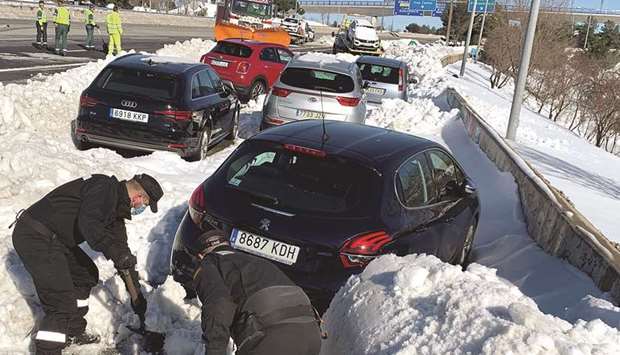Armed with picks and shovels, residents of Madrid slowly shovelled yesterday out of Spain’s worst snowstorm in decades which turned roads and pavements into skating rinks.
Schools remained shut, some supermarkets ran out of fresh produce and few cars were on the streets as officials urged people to stay home after a huge snow storm hit the Spanish capital and several regions over the weekend.
However, most flights and trains, including the high-speed link to Barcelona, have resumed operations.
Emergency services workers and soldiers freed 2,500 drivers trapped in their vehicles by the storm, which killed at least three people.
Many people enjoyed the rare snowfall: people skied along the city’s main commercial street, the Gran Via, and held massive snowball fights despite pandemic restrictions on the size of groups which can meet in public.
One man was filmed being pulled on a sled by dogs while others celebrated the snow by singing and dancing a congo in the central Puerta del Sol square.
But residents largely heeded the government’s call to stay at home.
A further cold spell is set to turn the snow into ice this week and authorities rushed to clear more streets.
However, lacking enough salt and snowploughs, the authorities had as of yesterday only managed to clear main roads of snow and fallen tree branches, with most pavements, smaller roads and residential areas still covered.
They said that it could take one or two weeks to complete, and snow ploughs only managed to clear a single lane on some avenues because of fallen trees blocking their path.
The regional government of Madrid has distributed 277 tonnes of salt to the area’s municipalities to prevent the formation of ice.
It is expected to receive another 3,500 tonnes of salt in the coming days from eastern Spain.
“It’s necessary to avoid any trip not considered essential or unavoidable,” Interior Ministry Fernando Grande-Marlaska told a press briefing, adding that the cold spell and icy conditions expected would be very dangerous for vehicles and pedestrians.
Residents of Madrid, which saw its heaviest snowfall in at least 50 years, helped police open paths through deep banks of snow using plywood boards or trays.
“We have cleared a passage with a borrowed shovel, especially for older people,” Blanca Fernandez, a 39-year-old optician’s employee told AFP as she cleared a sidewalk in front of her shop along with a co-worker. “The situation is so hard that we wanted to help.”
With blocks of melting snow occasionally falling from rooftops, police cordoned off some pavements, and residents took to walking in the middle of the road.
The Madrid regional government delayed until January 18 the reopening of schools, citing the difficulty of accessing them and the damage some suffered.
The storm, which dumped up to 50cm (20”) of snow on Madrid, has hampered Spain’s efforts to increase the pace of its coronavirus vaccination programme amid rising infections.
A new batch of vaccines meant to land in Madrid was diverted yesterday to Vitoria-Gasteiz in the north, but city authorities said vaccinations in nursing homes and hospitals continued as planned.
Access to two factories in Madrid operated by pharmaceutical company Rovi, which handles the final stages of production for Moderna’s recently approved vaccine before its export across Europe, were blocked by snow, Reuters TV footage showed.
Rovi declined to comment.
Spain’s Defence Minister Margarita Robles said the military would disinfect nursing homes, citing a fear that the storm could increase the spread of the coronavirus.
Two runways at Madrid’s Barajas international airport and a terminal re-opened, authorities said, although over a hundred flights had been cancelled.
A Reuters reporter saw a number of empty shelves at several central Madrid supermarkets.
The Spanish supermarket association urged customers to behave responsibly in view of a “complicated situation” in many storm-affected areas.
However, it said supplies had resumed in the early hours of the day and were gradually increasing.
Mercamadrid, the city’s main wholesale food market, said convoys of trucks which had been stranded in the snow since Friday had started arriving and that it was preparing to resume activity last night.
About 85% of nightspots and restaurants in Madrid, that had been open despite the coronavirus pandemic, are still closed because of the weather, the Hosteleria de España association said.
The cold wave, with temperatures as low as -10° Celsius in central Spain, will last until Thursday, the Aemet meteorological agency said.

Members of Spain’s military unit (UME) shovel snow to open a pass next to cars accumulated on M-40 highway following heavy snowfall in Madrid.
